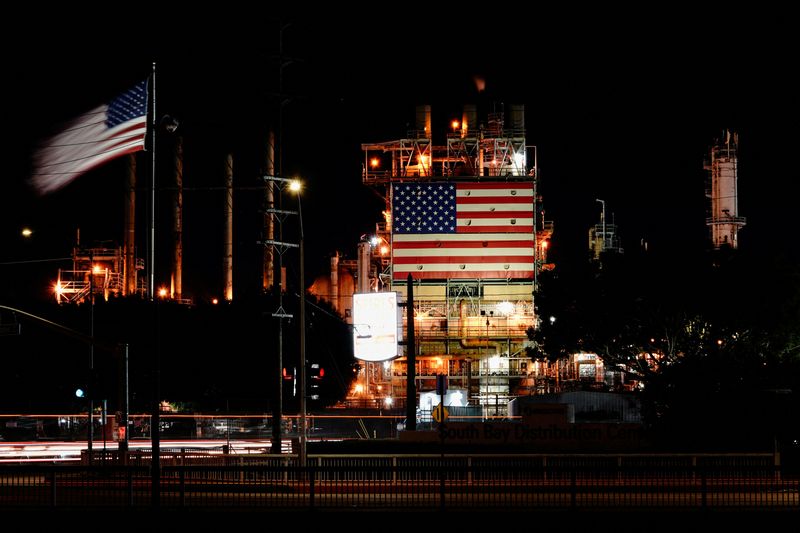
By Nicole Jao
NEW YORK (Reuters) – Top U.S. refiners are poised to seek alternative sources for heavy, sour crudes, including running more domestic grades, as they await clarity around U.S. President Donald Trump’s threatened tariffs on imports from the nation’s top crude suppliers Canada and Mexico, executives said.
Running more domestic crude, which is predominantly light, sweet shale oil, through U.S. refineries could be a win for Trump, who has vowed to boost the nation’s energy production and championed the fossil fuel industry.
The tariffs, however, have generated concern among refiners, who are already watching profits slide from record highs in 2022 on softer demand, as they would now take a hit from higher feedstock costs. More than 70% of U.S. processing capacity is configured to run heavier grades, which are cheaper to import from Canada and Mexico.
Trump, who took office on January 20, plans to charge a 25% tariff on Mexican crude and a 10% levy on Canadian crude beginning in March, a delay from his original plan. Canada, the biggest oil supplier to the U.S., exports some 4 million barrels per day (bpd) of crude into the U.S., 70% of which is processed by Mid-Continent refiners.
Marathon Petroleum, the top U.S. refiner by volume, said its refineries in the Mid-Continent region could switch from processing heavy sour crude to other grades.
“We could look to pivot to alternative crudes because of our logistics capabilities,” Rick Hessling, chief commercial officer at Marathon Petroleum, told investors during the company’s fourth-quarter earnings call this month.
Hessling added that domestic crude from the Bakken shale formation in North Dakota and the Rocky Mountains could be among their options.
Ohio-based Marathon operates 13 refineries in the U.S., six of which are located in the Midwest. Its 253,000-bpd refinery in Robinson, Illinois, processes large amounts of heavy crude from Canada.
The refiner warned that costs could rise if Trump’s tariff plans go through, but the burden would primarily be borne by Canadian oil producers and, to a lesser extent, U.S. consumers.
“We’re working with the administration and we’re working with agencies, as well as the trade associations, to be sure that the right people understand the implications of these decisions,” Marathon CEO Maryann Mannen said.
Texas-based HF Sinclair, which operates seven complex refineries, could process more light sweet crude.
“What we believe in our refineries is we have the ability to lighten up,” Steve Ledbetter, executive vice president of commercial at HF Sinclair, said during the company’s earnings call on Thursday. Its refining system is connected to the key crude oil delivery hub in Cushing, Oklahoma, Ledbetter added.
